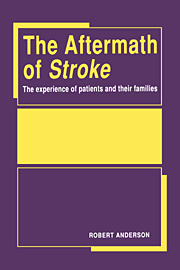Book contents
- Frontmatter
- Contents
- Acknowledgements
- Chapter 1 Stroke: An introduction to the problem
- Chapter 2 The Greenwich stroke study
- Chapter 3 Coming into medical care: the first month after stroke
- Chapter 4 Hospital care and rehabilitation
- Chapter 5 Survival, physical disability and health
- Chapter 6 Support in the community
- Chapter 7 The effects of stroke on social, family and personal life
- Chapter 8 Caring and coping with stroke
- Chapter 9 Resources for coping with stroke
- Appendix: Measurement and scoring of variables
- References
- Index
Chapter 8 - Caring and coping with stroke
Published online by Cambridge University Press: 07 October 2011
- Frontmatter
- Contents
- Acknowledgements
- Chapter 1 Stroke: An introduction to the problem
- Chapter 2 The Greenwich stroke study
- Chapter 3 Coming into medical care: the first month after stroke
- Chapter 4 Hospital care and rehabilitation
- Chapter 5 Survival, physical disability and health
- Chapter 6 Support in the community
- Chapter 7 The effects of stroke on social, family and personal life
- Chapter 8 Caring and coping with stroke
- Chapter 9 Resources for coping with stroke
- Appendix: Measurement and scoring of variables
- References
- Index
Summary
The burden of caring and the stress on carers has in recent years moved to centre stage in debates – scholarly, popular and political – about the conditions for care in the community of people with chronic physical and mental disability. There is concern about the health of carers, about the financial, social and emotional impoverishment caused by caring, and about the handicapping of carers', principally women's, lives (Anderson, 1987). Among the cultural expectations associated with caring, a persistent theme seems to be that caring is essentially women's work (Finch and Groves, 1983). Whatever the implications of this expectation, it is evident that the job of caring for a disabled person is surrounded by cultural assumptions: about who should care; about mutual and family obligations; and, particularly when caring is predominantly for older people, about its value and importance for society.
Caring may be taken on as a ‘natural’ response to loving someone, as a duty or obligation, or out of guilt and a lack of alternatives. These attitudes to caring will influence responses to the patient's needs and to caring tasks; and they present complex factors mediating between caring and how supporters feel about this. This chapter begins with a preliminary discussion of attitudes to caring, followed by an analysis of the supporters' experience of burden. It continues by looking at the role of information in helping patients and supporters to cope, and concludes with the views of patients and supporters on the outcome 18 months after stroke.
- Type
- Chapter
- Information
- The Aftermath of StrokeThe Experience of Patients and their Families, pp. 179 - 216Publisher: Cambridge University PressPrint publication year: 1992



